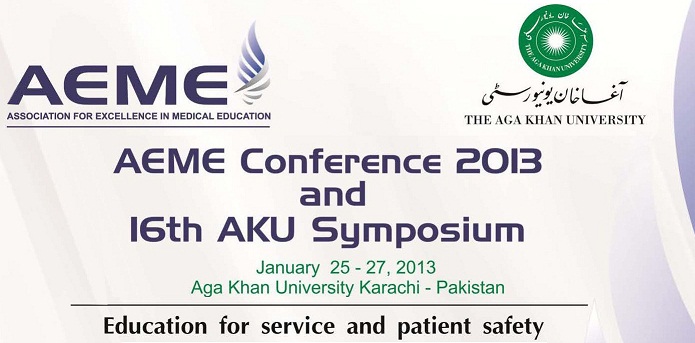Day 1 : Oral Presentations (Theme: Evaluation & Quality Assurance)
Evaluating an elective in Health Professions Education
Location
Lecture Hall 1
Start Date
26-1-2013 4:00 PM
Abstract
Background: In the developing world, the resident’s role as a teacher for the junior residents, medical students and interns is been increasingly recognized. Literature reports that 20% of the resident time is spent on teaching; they are found to be responsible for 80% of the education of interns and medical students. The faculty also feels that learning to teach should be an integral part of resident education. The published literature review from 1950-2009 describes limited period interventions ranging from one hour session to full day retreats. There were no studies found in the region or in the local context. A two months elective rotation has been developed by the Department for Educational Development (DED), Aga Khan University (AKU) for residents in order to improve their teaching skills and to develop an understanding of the philosophical underpinnings of health professions education. This elective is expected to help resident recognize the basic concepts in health professions education and their application. Objectives The objectives of the study were to evaluate the process for developing the elective, issues in implementation, feedback obtained by the resident and faculty, and assessment strategies adopted.
Methods: A management oriented framework was selected for evaluation and within it the CIPP (context, input, process and product). The evaluation is structured around the programs developmental stage, implementation stage and assessment stage. The specific aspects of the curriculum that studied included its usefulness in providing learning guidance, integration of educational philosophies and concepts, achievement of expected learning outcomes, and appropriateness of key content areas, instructional methodologies, and assessment strategies used.
Results: The resident was able to achieve the objectives in a very timely fashion. The overall learning enhanced with increased capability to apply the philosophical underpinnings. The overall curriculum design was according to the resident’s interest and the departmental need, with some key areas covered in depth with hands-on experience.
Conclusions: Medical Residents are very much involved in educating their junior colleagues. There is a need of a formal of training program in educational skills. An elective provides a forum for residents wanting to enhance their educational skills. Working with busy faculty required a lot of coordination and some readjustments in the schedule. This study helped identify strengths and areas needing improvement for the Elective in Health Professions Education and provided a model, which can be replicated in other institutions with revisions or modifications in the light of the findings.
Key words: Health Professions Education, Elective, Postgraduate Medical Education, short course
Evaluating an elective in Health Professions Education
Lecture Hall 1
Background: In the developing world, the resident’s role as a teacher for the junior residents, medical students and interns is been increasingly recognized. Literature reports that 20% of the resident time is spent on teaching; they are found to be responsible for 80% of the education of interns and medical students. The faculty also feels that learning to teach should be an integral part of resident education. The published literature review from 1950-2009 describes limited period interventions ranging from one hour session to full day retreats. There were no studies found in the region or in the local context. A two months elective rotation has been developed by the Department for Educational Development (DED), Aga Khan University (AKU) for residents in order to improve their teaching skills and to develop an understanding of the philosophical underpinnings of health professions education. This elective is expected to help resident recognize the basic concepts in health professions education and their application. Objectives The objectives of the study were to evaluate the process for developing the elective, issues in implementation, feedback obtained by the resident and faculty, and assessment strategies adopted.
Methods: A management oriented framework was selected for evaluation and within it the CIPP (context, input, process and product). The evaluation is structured around the programs developmental stage, implementation stage and assessment stage. The specific aspects of the curriculum that studied included its usefulness in providing learning guidance, integration of educational philosophies and concepts, achievement of expected learning outcomes, and appropriateness of key content areas, instructional methodologies, and assessment strategies used.
Results: The resident was able to achieve the objectives in a very timely fashion. The overall learning enhanced with increased capability to apply the philosophical underpinnings. The overall curriculum design was according to the resident’s interest and the departmental need, with some key areas covered in depth with hands-on experience.
Conclusions: Medical Residents are very much involved in educating their junior colleagues. There is a need of a formal of training program in educational skills. An elective provides a forum for residents wanting to enhance their educational skills. Working with busy faculty required a lot of coordination and some readjustments in the schedule. This study helped identify strengths and areas needing improvement for the Elective in Health Professions Education and provided a model, which can be replicated in other institutions with revisions or modifications in the light of the findings.
Key words: Health Professions Education, Elective, Postgraduate Medical Education, short course

